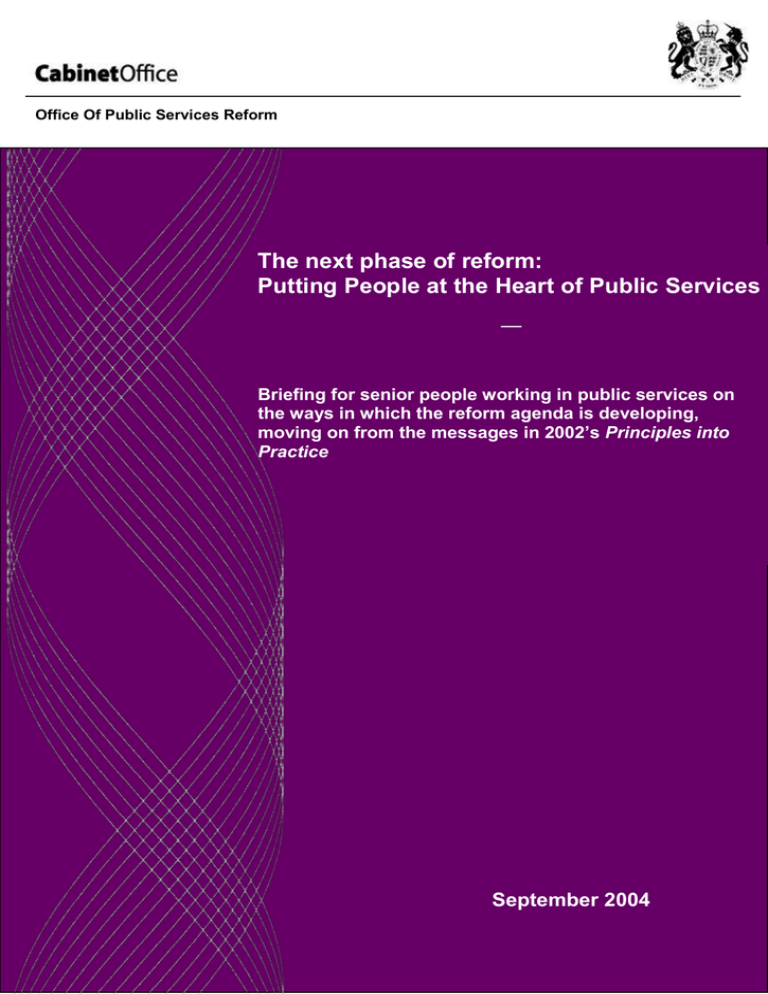The next phase of reform: —
advertisement

Office Of Public Services Reform The next phase of reform: Putting People at the Heart of Public Services — Briefing for senior people working in public services on the ways in which the reform agenda is developing, moving on from the messages in 2002’s Principles into Practice September 2004 Introduction Public services define the nature of UK society and reflect its values and commitment to social justice and equity. The Prime Minister’s vision combines choice, excellence, and equality in a modern universal welfare state, developing a ‘ new personalised concept of public services. “Now, on the basis of clear progress, is the time to accelerate reform. In simple terms, recasting the 1945 welfare state to end entirely the era of ‘one size fits all’ services and put in place modern services which maintain at their core the values of equality of access and opportunity for all: base the service around the user, a personalised service with real choice, greater individual responsibility and high standards, and ensure in so doing that we keep our public services universal.” “We are proposing to put an entirely different dynamic in place to drive our public services: one where the service will be driven not by the managers but by the user – the patient, the parent, the pupil, and law abiding citizen. “ In the coming months, each of the main public services is producing a 5 year strategy with a core narrative containing three key elements: At the heart of public services is a new deal with more offered to – and more expected from – citizens. Putting people in the driving seat, through choice, personalisation and voice. And through this, embedding a new process of continuing improvement. Investment and Reform This next phase for public services is only possible because of the efforts of millions of public service staff who are working with the increased public investment in their services to provide a base for improvement. Increased public investment has been sustained for over five years and is planned for another three. With this investment, the capacity of public services has been greatly increased, with over 500,000 new jobs created since 1998. Staff are better able to meet people’s needs, because they are better-equipped, with new buildings, IT, and supplies and are working in teams with an increasing variety of skills and abilities. Alongside investment, the next priority has been the development of clear national standards and strengthening accountability for delivering them. As a result, more progress has been made so far on national standards than on devolution or choice. These will inform the next phase of development. The next phase – Putting People at the Heart of Public Services Through GPs, teachers, personal advisers, case-managers, customer service staff and others, we must tailor services to the diverse needs and preferences of every individual. We live in a diverse society which means that to meet differing needs, people will have meaningful choices on where, when and how they access services and on the services themselves. Relevant, reliable and timely information will be available to better inform people to make decisions for themselves. Service providers will receive incentives that focus on improving the customer experience. Most importantly, it will mean a new deal in which people receive a personalised service and in return take on new responsibilities. Sustained improvement For public services to be driven by the diverse needs of every individual within a framework of national standards, our system must be capable of sustained improvement. Continuing focus on standards Clear national standards must continue to be at the heart of the relationship between the government and the people who work in public services, but accountability between people who work in, and people who use services also should be strengthened. This will mean continuing to focus on the areas that people say matter most to them – access, waiting times, pupil attainment, personal security – and improving our approach to targets. To drive improvement, greater emphasis will be placed on what matters to customers and their personal experience. Service standards will be developed where there are none as yet, and targets will become part of the overall platform of expectations. Users and professionals should be involved in the process of target setting, securing their commitment and drawing on their expertise. The number of central targets should continue to be reduced, with more scope for targets that are set locally. Stronger personal and local accountability Objectives and targets should be expressed so it is clear what people should expect, and wherever possible should provide a binding guarantee. Information about performance should be relevant to individuals using the service, telling them the things they need to know to make informed decisions. Individual professionals and local institutions should have the devolved responsibility they need to serve their customers well. To this end, further moves should be made to devolve responsibility. In addition to tailoring services to meet individuals’ personal requirements, the public also should be offered more effective ways of exercising their collective voice . Communities really do want to have a say in genuinely local issues that matter to them. Real engagement in local public service issues may be the most attractive means for people to contribute to their community. For public services to really work, they cannot be ‘delivered’ in an external way to ‘the public’. You cannot make a person healthy; you cannot make a pupil learn. Unless they are actively involved in this process, very little happens. The reasons for improving accountability at every level is to ensure that they are. The challenge therefore is to move to more direct forms of accountability. Part of this will be about providing timely and locally relevant performance data to local service users and residents so that they are better equipped to challenge their local services. It may also mean experimenting with new forms of participation – on single issues, the environment, anti-social behaviours – as well as through governance of councils, schools, and other public services. Greater Choice and personalisation Extending choice is both an effective driver for improving quality and a good device for satisfying and enabling greater equity for the highly diverse individuals and communities using public services. Accordingly, wherever choice can be expanded to further these objectives, it should be. This will mean going beyond providing people with a choice of where and when they access a service (important as this is) to offering a real say over the type of service they want. The design of policy will be crucial, to avoid unacceptable cost, and to ensure that everyone receives help to make ‘supported choice’ – whether it be with transport, information or advice. There are already examples where choice is proving successful. Not only in the health service with choice of alternative hospitals for important surgery, but in social services with direct payments and in social housing with choice based lettings. More flexibility The kind of professionals that public services need for the future are those who put people at the heart of their service – making them central to the way they understand their role, gain their status, knowledge and expertise. Such attitudes and expertise are not what has traditionally driven public sector professionals in the past. In the early stages, it will continue to involve holding professionals to account for the increasing public investment, making their performance more transparent, and subjecting it to independent regulation. As the power of choice, voice and contestability takes hold, so professionals will experience greater accountability to their clients, and within a national framework of standards, have greater freedom to meet their requirements. A shift of power to the public - as informed citizens and customers – should become linked with an empowered role for professionals. In some cases, this involves new occupations and career paths (classroom assistants, personal healthcare advisers, community safety officers), in others it will mean changing responsibility for particular activities or tasks (more GP specialists, greater nurse prescribing). While some of these changes may need central direction, Government’s key role is enabling greater freedom for local professionals and managers to develop the roles and structures they need to respond to individual needs and local requirements. Public spirited trade unions and workers will see the benefit such changes hold for the public service, and their members. A more diverse and vibrant capacity The case for ending ‘one size fits all’ services will be enabled by a more diverse set of public service providers. Diversity helps bring choice to life by offering customers meaningful options over the nature of the service they access (e.g. different specialist schools). Contestability can drive improvement where user choice is inevitably nonexistent (e.g. prisons), voice is not fully developed (e.g. PCTs), and where too much reliance on top-down controls should be avoided. Replacing under-performers with high-performers addresses the sometimes stark variations in performance that exist between similar providers, producing similar services in similar circumstances. Encouraging new providers drives innovation as they bring new ideas and challenge existing ways of doing things. Often this means finding more efficient ways of delivering. Encouraging successful providers to run services in more than one area (e.g. ‘federations’ or ‘syndicates’) can be highly effective in making the most of valuable leadership talent, enabling successful forms of provision to be replicated, and reaping economies of scale. Creating a more diverse and vibrant capacity will often mean contestability between different public providers, but it will also mean doing more to encourage new private and voluntary sector providers together with social enterprise. Government with people at its heart Public services will need to be organised differently if they are to sustain improvement that is well-governed by national and local policies, as well as personal service requirements. They will need a set of responsive structures, systems and people dedicated to supporting the delivery of personalised services. Effective leadership is critical. A programme of civil service reform is supporting people who work in central government to rise to the modern challenges of putting customers first, developing a wider range of delivery skills, and improving the way that people are led, managed and developed. Leadership is equally important to the success of local services - schools, councils, primary care, hospitals, police services - and each of these areas is investing in developing leaders to transform their organisations. The relationship between central and local delivery will be key to creating this circle of self-improvement. Policy development, target-setting, communicating with citizens and the public, advising ministers - will be done more effectively with the contribution of experts from local delivery as well as the centre. Smarter information flows through the system will help, as will more selective targeting of interventions and streamlined arrangements for planning, funding and delivery. Successful performance should be recognised with more freedoms, and less inspection, whilst failure must be turned around swiftly. Public services need to be affordable to be capable of sustained improvement. This is where the efficiency drive fits in – not as just a one off exercise, but to introduce new ways of working that will continue to release resources for the front line. The move to smaller and more strategic central departments, and greater use of IT, will free up resources for the front line and create more jobs in personal services to local communities. The transition will need careful managing, and to provide support for people affected by the changes. What does it mean for people serving the public? For reform to be self-sustaining, the millions of people involved in providing public services will have to know what is expected of them and, with this internalised understanding, do the ‘right’ thing whenever they are faced with a decision. This kind of reform will be value driven. It will build on the vocational commitment to serving the public that is the core of the ‘public service ethos’, across different services and sectors. Values that will produce a better personal return to citizens and users for public investment First, is a belief in fairness and equity. Experience shows that equity will not result from giving everyone the same ‘one size fits all’ service. Individuals do not start off in the same place, so if we want greater equality of opportunity it is essential that specific support is provided for those who are particularly disadvantaged. This is not an entirely new idea or drastic departure from previous public policy. The formula that determines how local authorities and services are funded provides more resources for those areas that have greater need. But equity demands difference not only in the distribution of resources, but also in the nature of the services that different people are offered. Second, is a responsibility for every service to do its best for each and every individual it serves. Every provider must operate to clear national standards, and be open and honest about their performance. They will be inspected to these standards and information will be available to better inform the public on their record. Third, is for organisations to positively enable individuals to decide the service they want, helping people to make choices between different providers, and bringing innovation into the options that they offer in their services. This is important in making choice the driver of change as well as for serving people better right now. Fourth, is to recognise that for many services to really generate public value, individuals using them have to take personal responsibility – for learning, for looking after their health, for taking care of their neighbourhoods. Professionals must not believe that they know best nor that they can make people better or wiser. Fifth, in order for services to make more specific offers from which they enable people to choose, they need to have more control over their institutions to make them more distinctive. They need the flexibility to join up with other organisations in the interests of serving people better. They need to be able to attract and reward the people with the right skills and attitudes to deliver their particular range of services.

![-----Original Message----- From: D'Ann Grimmett [ ]](http://s2.studylib.net/store/data/015587774_1-b8b0167afe0c6fb42038c4518a661b2a-300x300.png)

